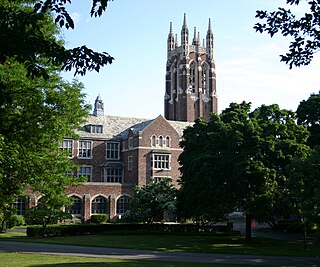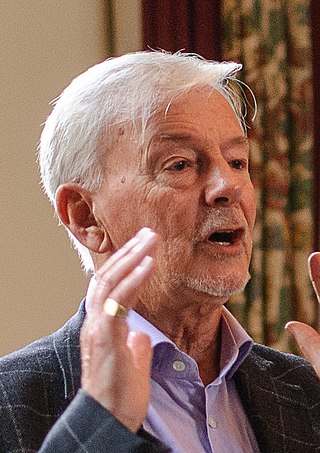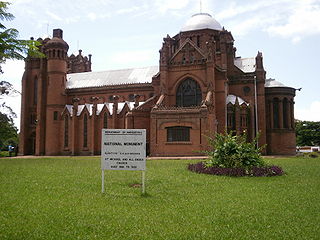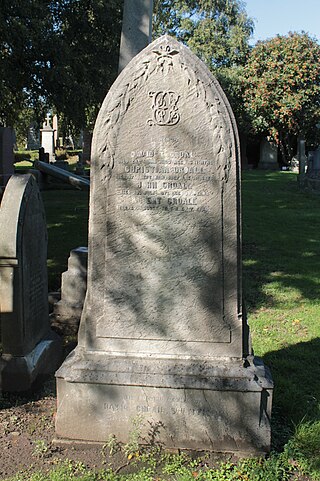Related Research Articles
Theology is the study of religious belief from a religious perspective. More narrowly it is the study of the nature of the divine. It is taught as an academic discipline, typically in universities and seminaries. It occupies itself with the unique content of analyzing the supernatural, but also deals with religious epistemology, asks and seeks to answer the question of revelation. Revelation pertains to the acceptance of God, gods, or deities, as not only transcendent or above the natural world, but also willing and able to interact with the natural world and to reveal themselves to humankind.

Ubuntu describes a set of closely related African-origin value systems that emphasize the interconnectedness of individuals with their surrounding societal and physical worlds. "Ubuntu" is sometimes translated as "I am because we are", or "humanity towards others". In Xhosa, the latter term is used, but is often meant in a more philosophical sense to mean "the belief in a universal bond of sharing that connects all humanity".
The music of Malawi has historically been influenced by its triple cultural heritage of British, African, and American music. Malawians, known for their history as travelers and migrant workers, have contributed to the spread of their music across the African continent, blending it with various musical forms. A significant factor in this musical amalgamation was World War II, during which soldiers transported music to distant lands and brought it back, leading to the popularity of guitar and banjo duos as dance bands by the war's end. Both instruments were imported. Additionally, Malawians working in mines in South Africa and Mozambique influenced the fusion of music styles, giving rise to genres such as Kwela.

Blantyre is Malawi's centre of finance and commerce, and its second largest city, with a population of 800,264 as of 2018. It is sometimes referred to as the commercial and industrial capital of Malawi as opposed to the political capital, Lilongwe. It is the capital of the country's Southern Region as well as the Blantyre District.

Andrew Linzey is an English Anglican priest, theologian, and prominent figure in Christian vegetarianism. He is a member of the Faculty of Theology at the University of Oxford, and held the world's first academic post in Ethics, Theology and Animal Welfare, the Bede Jarret Senior Research Fellowship at Blackfriars Hall.

Colgate Rochester Crozer Divinity School is a Baptist seminary in Rochester, New York. It is affiliated with the American Baptist Churches USA.

Keith Ward is an English philosopher and theologian. He is a fellow of the British Academy and a priest of the Church of England. He was a canon of Christ Church, Oxford, until 2003. Comparative theology and the relationship between science and religion are two of his main topics of interest.
The University of Chicago Divinity School is a private graduate institution at the University of Chicago dedicated to the training of academics and clergy across religious boundaries. Formed under Baptist auspices, the school today lacks any sectarian affiliations.

The University of Malawi (UNIMA) is a public university established in 1965 and until 4 May 2021, when the university underwent a delinking, was composed of four constituent colleges located in Zomba, Blantyre, and Lilongwe. Of the four colleges, the largest is Chancellor College in Zomba. It is part of the Malawian government educational system. The last Vice-Chancellor was Professor John Kalenga Saka.
African theology is Christian theology from the perspective of the African cultural context. It should be distinguished from black theology, which originated from the American and South African context and is more closely aligned with liberation theology. Although there are ancient Christian traditions on the African continent, during the modern period Christianity in Africa was significantly influenced by western forms of Christianity brought about by European colonization.

Islam is the second largest religion in Malawi behind Christianity. Nearly all of Malawi's Muslims adhere to Sunni Islam. Though difficult to assess, according to the CIA Factbook, in 2018 about 13.8% of the country's population was Muslim. Muslim organisations in the country claim a figure of 15-20%. According to the latest census (2018), Muslims make up 13.8% (2,426,754) of the country's population. According to the Malawi Religion Project run by the University of Pennsylvania, in 2010 approximately 19.6% of the population was Muslim, concentrated mostly in the Southern Region.
Gayraud Stephen Wilmore Jr. was an American writer, historian, ethicist, educator, and theologian, known for his role in the Civil Rights Movement and his scholarship related to the history of the African-American church and the history of African-American religious experience, as well as his contributions to black theology.

Hinduism in Malawi arrived when Indian colonists and mercantilists were brought by the colonial British administrators in the late 19th and early 20th-century in what was then known as British Central Africa and later Nyasaland. They were a part of a global movement of workers to parts of East Africa, to help build infrastructure projects, establish services, retail markets and for administrative support. The immigrants, some educated and skilled but mostly poor and struggling in famine prone areas of Punjab, Gujarat, Uttar Pradesh, Bihar and West Bengal, helped construct the first railway line between Malawi and Mozambique.
Daniel Patte is a French-American biblical scholar and author. Patte is, since 2013, professor emeritus of Religious Studies, New Testament and Christianity at Vanderbilt University where he taught from 1971. He studied in both European and American schools: following his Baccalauréat in Philosophy he received a Baccalauréat en Théologie (1960) from the Faculté de Théologie Protestante, Montpellier, France, where he met his wife, Aline Teitelbaum; Licence en Théologie, from the University of Geneva, Switzerland, and a Th.D. (1971) from the Jewish Christian Center at Chicago Theological Seminary. As a biblical scholar and teacher in various settings around the world, Patte calls for an ethics of biblical interpretation that involves acknowledging the contextual character of any interpretation of the Bible, as his numerous books and articles indicate. In the 1970s-1980s Patte pioneered structural criticism in biblical studies, then served two terms (1992–98) as the General Editor of Semeia, an Experimental Journal for Biblical Criticism of the Society of Biblical Literature. Patte initiated and chaired programs of the Society of Biblical Literature, including on Semiotic and Exegesis, Romans Through History and Cultures, and, since 2007, Contextual Biblical Interpretation. With colleagues of the Society of Biblical Literature and of the American Academy of Religion involved in these programs, he envisioned and edited A Global Bible Commentary (2004) and The Cambridge Dictionary of Christianity (2010).

William Henry Brackney (1948–2022) was the Millard R. Cherry Distinguished Professor of Christian Thought and Ethics Emeritus at Acadia University in Wolfville, Nova Scotia, and an ordained Baptist minister, accredited by the Convention of Atlantic Baptist Churches and the American Baptist Churches, USA. He was previously the Dean of Theology at McMaster University in Hamilton, Ontario, and published numerous books and articles dealing with post-Reformation Protestant thought, particularly the Baptist and Radical Reformation traditions. Brackney did significant work in the areas of global ethics and human rights, and was the director of the Acadia Centre for Baptist and Anabaptist Studies (2008–2018). He was also a regular columnist for websites focused on ethics.

The Church of Central Africa Presbyterian (CCAP) is a Presbyterian denomination. It consists of five synods: one in Zambia, one in Zimbabwe and three in Malawi – Livingstonia Synod in the north of the country, Nkhoma Synod in the centre, and Blantyre Synod in the south.
Witness Kay Chiromo was a Malawian artist and art educator. He was born in Makoka Village, T.A. Chigaru, Blantyre District. He is considered as one of the most talented and respected artists from Malawi. His medium was oil paintings but he also carried out book illustrations and made a video documentary.

Lazarus McCarthy Chakwera is a Malawian politician and theologian who has served as President of Malawi and minister of defence since June 2020. He also serves as minister of defence per Malawian constitution, he has served as the leader of the Malawi Congress Party since 2013. He was President of the Malawi Assemblies of God from 1989 to 2013.

The Croall Lectures are a lecture series in Christian theology given in Edinburgh, and founded in 1876. The Lectures were endowed by John Croall of Southfield, who died in 1871.
Isabel Apawo Phiri is a Malawian theologian known for her work in gender justice, HIV/AIDS, and African theology. She has been a Deputy Secretary for the World Council of Churches since 2012.
References
- ↑ "The Maravi Post - 404 maravipost.com" . Retrieved 17 October 2014.[ permanent dead link ]
- ↑ "Helping: Hamilton or Malawi, CMH Nurse & Husband at Colgate Heed the Call". Blantyre North Relief Project. Retrieved 2024-02-17.
- 1 2 "Colgate University : Faculty Directory - Harvey Sindima". Archived from the original on 2011-09-19. Retrieved 2011-09-10.